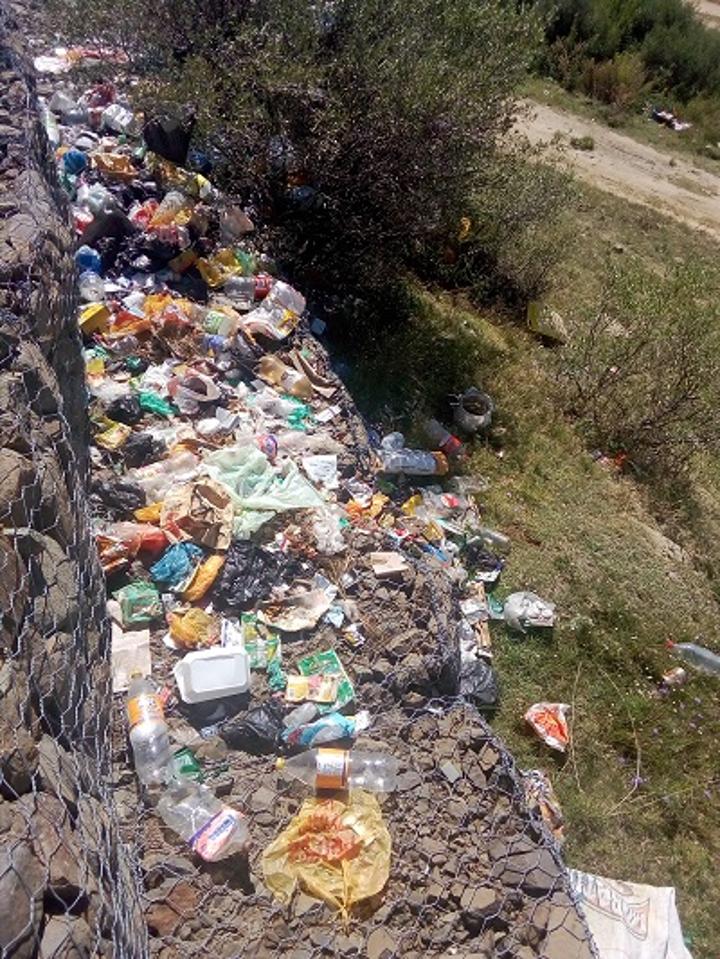Africa-Press – Lesotho. Not only is it an eye sore, the poor and unhealthy disposal of waste threatens the biodiversity, causes land and water pollution and clogs the drainage systems along the roads resulting in unhygienic conditions.
The poor waste management is said to be compounded by amongst others lack of waste management infrastructures and lack of environmental education awareness to the
consumers. To effectively address this anomaly, it is reported that there ought to be proper handling of waste, transporting it and disposing it. There
are also injuries associated to poorly disposed waste especially to the children, harmful containers, poorly disposed health waste, needles and blades
and sometimes explosive containers all run risk of causing injuries to children and animals especially at the unregulated landfill site. Poor waste management also poses health
problems as it could cause some diseases. While it is argued that nature is “fragile”, it has also been argued by scientists that poor waste management have a causal effect on the climate change.
On the flip side, when properly managed, solid waste have the capacity of generating income. Not only that, with the advances made through research, innovations and
science the solid waste could be turned into energy. The concept of recycling which is about reduce, reuse and recycle is highly encouraged. It is also about the promotion of the humans healthy interactions
with the environment. There are economic benefits attached to recycling. Although the levy did not see the light of the day, in 2017 Lesotho had attempted to introduce the plastic levy which would see the country
collecting 50 cents on plastics, a move which would generate income for the country while also curbing the problem of plastic waste. Meanwhile, some countries have banned the usage of plastics and
some have imposed plastic levies to curb pollution resulting from them. Lesotho is a party to some of the treaties which advocate and aspire to attain healthy
environment conditions through promotion of environmentally healthy practices and the legal instruments and policies to ensure compliance on the part of the
consumers and the manufactures. Some of those environmental agreements include: the United Nations Agenda 21, the Stockholm Convention on Persistent Organic Pollutants, Basel
Convention on the Control of Transboundary Movements of Hazardous Wastes and Their Disposal, Vienna Convention on Ozone Layer and Montreal Protocol on Ozone Depleting Substances
(ODS). The goal number 15 of the Sustainable Development Goals (SDGs) is about life on land.
To attain it, the communities ought to “introduce measures to prevent the introduction and significantly reduce the impact of invasive alien species on
the land and water ecosystems and control…. ” Similar to it is goal number six which advocates for clean water and sanitation. One of the aspirations in realising this goal is that “by 2030, [countries should]
improve the water quality by reducing pollution, eliminating dumping and minimizing release of hazardous chemicals and materials, halving the proportion
of untreated wastewater and substantially increasing recycling and safe reuse globally”. The Section 36 of the Constitution of Lesotho holds that: “Lesotho shall adopt policies designed to
protect and enhance the natural and cultural environment of Lesotho for the benefit of both present and future generations and shall endeavour to assure to
all citizens a sound and safe environment adequate for their health and well-being. ” In view of promoting healthy environmental practices and inculcating the spirit of cleanliness to the communities, the government,
business community and the non-governmental organisations (NGOs) mount cleaning campaigns in towns, along the main roads and as well as within the communities
although in some places this practice is not sustained for longer period of time. Kobeli Tšasanyane of the Department of Environment in Pollution Control at the Ministry
of Tourism, Environment and Culture said the cost of cleaning the litter from the streets is high. Tšasanyane charged that, “litter basically results from
irresponsible social attitudes. ” He further mentioned that it costs six to nine times to sweep a tonne of garbage from the streets than collecting it from the household waste.
“Litter continues to be a problem on our streets, roadsides, countryside
and water bodies,” he said adding that it “has a negative effect on tourism by creating dirty and unaesthetic conditions. ” He indicated that most of the
plastics have been derived from petrochemical feedstock, the component which originates from oil, natural gas and coal. Tšasanyane said the plastic bags do not “biodegrade”
instead they “photodegrade” that is, they will gradually break into smaller, more toxic petro-polymers and then contaminate the soil and waterways. Carelessly disposed, he said poly bags are hazardous to
food, could cause animal deaths and suffocate children if swallowed and reduce the landfill lifespan. The United Nations Development Programme (UNDP)’s Deputy Resident Representative
Nessie Golakai-Gould underscored the importance of collaboration in defeating the challenge of poor waste management and the plastic pollution. She argued that: “Different people hold different pieces of
information and different perspectives that, when combined, create a more complete picture of a problem and how to solve it. Solving this complex problem requires new approaches to
problem solving though the use of various sources of data to rapidly understand the dynamics of what is happening; harnessing collective brainpower to generate
multiple solutions much more quickly; facilitating space to think, reflect and decide collectively on a new course of action; and facilitating real-time
adjustments and orchestrating knowledge that enables others to act too. ” Golakai-Gould further added that “we can collectively work side by side in solving this multidimensional plastic pollution challenge in Lesotho”.
Citing the Human Development Report 2020, themed “Human Development and the Anthropocene”, she said the report has established the interdependency between human progress and the emerging planetary challenges.
“And recommends actions that may reduce the negative impact on the environment to minimise
resultant shocks and inequalities” she emphasized. The Ministry of Tourism, Environment and Culture Principal Secretary (PS) Moliehi Moejane remarked that the country faces “imminent and serious waste problems”.
Moejane underscored the need for collective effort in addressing the waste management challenge. Taking stock of the public private partnership (PPP) for a holistic
approach to rethink waste, she argued that properly handling waste from the community level could bring the economic spinoffs in the process. She said that could be achieved by “promoting” the 7Rs which are: Reduce, Reuse,
Recycle, Rethink, Research, Refuse and Recover, the move which she says “will lead to sustainable patterns of consumption and production”. “The need for proper management of our waste with a view to increase both
environmental and economic benefits, along with improved quality of life has been realised for over a decade and several activities were embarked on. These
include: establishment of the Committee on Waste Management (COWMAN) which advises on all waste management issues; assessment of waste types and quantities of waste; required infrastructure for waste management; required
human capacity for proper waste management in Maseru city; piloting of the Integrated Solid Waste Management Program in Maseru,” said the PS. Meanwhile
the UNDP’s Accelerator Lab last week conducted the plastic waste workshop with different stakeholders on the impact of plastic waste, solutions mapping on
existing interventions to address plastic pollution related challenges. This move according to the Accelerator Lab is hoped to bring home grown solutions
which will do away with the pollution while contributing to better development through engagements and collective intelligence. Some of the activities lined up for this innovation-based lab is to run plastic free
campaign and also to raise awareness on plastic pollution. This lab forges working relationship and work in concert with the people, government and the private sector to “reimagine development for the 21st
century”. The Accelerator Lab is yet to hold consultative fora with various stakeholders ranging from Maseru City Council (MCC), Non-governmental Organisations (NGOs) working on waste management, academia, the private sector
and the representation from the street vendors associations. The UNDP has forged the working relations with the Ministry, as the critical stakeholder.
Commenting on the proposed campaign, the UNDP Deputy Resident Representative noted that: “Plastics also impact Life on Land (SDG 15); threatening human substance and livelihood.
Everyone is at risk. Due to its slow biodegradability, plastic residue in soil and micro-plastics that remain in the environment pose health hazards to plants, animals and human lives.
“The campaign seeks to contribute to national actions on SDGs, and importantly help
reduce the plastic pollution in the country, towards a ‘plastic-free’ environment. The campaign will focus on the wide sphere of plastic waste in Lesotho, including the use of plastic bottle container, food foam containers, plastic bag and the similar.”
For More News And Analysis About Lesotho Follow Africa-Press






